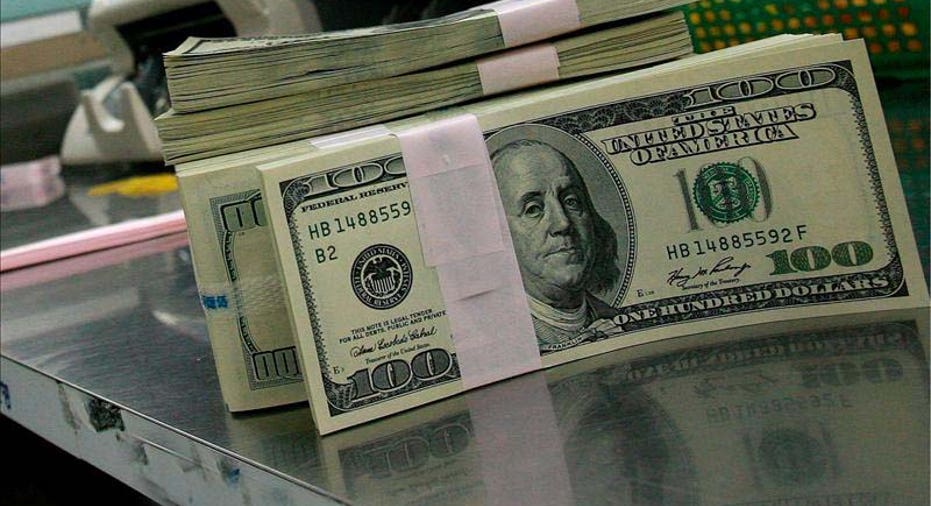The National Debt is Costing You Big Time

It’s a problem we hear about every day, but nobody thinks it directly affects them; the national debt. The U.S. owes more than $19.4 trillion in total public debt, more than the combined economic output of China, Japan and Germany.
That means every American is on the hook for $60,000.
While many assume it is simply the government’s problem, the debt is seriously impacting your money, your savings and your future.
Dr. Alan Axelrod, author of the upcoming book Full Faith and Credit: The National Debt, Taxes, Spending and the Bankrupting of America, tells FOXBusiness.com that the national debt is one of the most prominent risks facing Americans today: “It is an existential threat unlike terrorism, which is a terrible thing obviously. But the kind of terrorist attacks that we’ve experienced… do not represent a country-killing threat. The national debt is really an assault on our ability to continue to operate as a sovereign country.”
Our debt is harmful to our country’s ability to act as an independent entity. Out of the $19.4 trillion owed by the U.S. more than $6 trillion, or 30%, is owned by foreign countries. China and Japan are the top two U.S. debt holders, at $1.2 trillion and $1.1 trillion respectively, as tracked by the U.S. Department of Treasury. “This puts us in a position where we don’t want to piss them off,” explains Dr. Axelrod. “Sometimes that may well require compromising our sovereignty. It constrains us… our ability to continue to do business is in the hands of foreign entities.” Chris Edwards, Director of Tax Policy Studies at the Cato Institute, adds that because we owe so much money to other countries, “two decades from now people working and paying taxes will be paying a growing share of those taxes to foreign creditors. GDP will be escaping the country.” This situation could also easily create economic instability; what if one of our credit holders decided to dump its treasury assets? The list of cascading implications would be dire, warns Edwards.
Not only are there problems at the federal level, Main Street is getting dinged as well. “When you talk about the national debt... It is really our debt as Americans,” Axelrod says. The larger the debt grows, the more money you will owe. Furthermore, a growing national debt will “shrink long-term economic growth” and decrease standards of living across the board, explains Nick Gillespie, editor-in-chief of Reason.com. Don’t forget the government also pays interest on that debt; while rates are low, the interest is manageable. However, the Federal Reserve is moving closer to raising interest rates. In an interview with FOX Business earlier this week, New York Federal Reserve President William Dudley said a hike could happen as early as September.
The Debt, Your Money, This Election
For as long as many of us can remember, our country has been in debt. While the U.S. has added $4.6 trillion in GDP over the past 10 years, it has added $10.9 trillion in debt over the same period. It has not always been this way. In fact, throughout the majority of American history the budget has been balanced. So it can be done, but do Clinton or Trump have the policies to do it? Axelrod says no, but thinks Hillary is headed in a better direction. “Hillary Clinton’s policies would not add a huge amount to the national debt… she has a certain amount of tax reform and a certain amount of tax increase, especially in the upper brackets, that would bring in sufficient revenue to at least keep the national debt in the $20 trillion range.”
As for Donald Trump’s revised plan? “As it currently is… the emphasis is on tax cuts across the board, including a break for the very poor and the lower middle class… and a huge break for the highest bracket. His revised plan would add $7-9.5 trillion to the debt,” Axelrod says.
Edwards agrees neither Trump nor Clinton’s proposals will shrink the debt. “I think both candidates are failing the American people on addressing the federal debt issue, which is perhaps the most crucial issue facing Americans in the future… Neither candidate is talking about it; it is an abdication of responsibility.”
What Needs to Be Done Now
The debt might be approaching $20 trillion but the situation is not hopeless. Axelrod says there are steps our country can take now to get back on the right track. These include; cutting spending, developing means tests for entitlement programs, reducing bureaucracy, eliminating unnecessary regulations and reforming the tax code. “If we can free up more money into the general economy, the general economy will become more productive and the government will become more productive.” A more productive government would also mean less debt for you. Until the U.S. starts working toward a solution, Edwards reminds us of one very important thing, “every dollar the government borrows now is a dollar future Americans won’t have.”



















